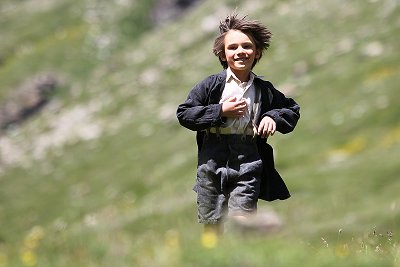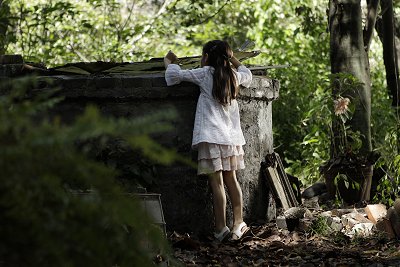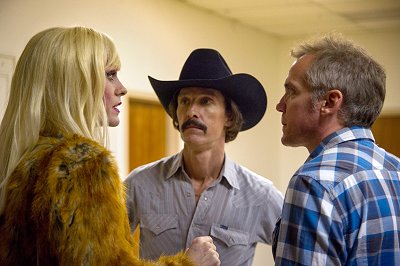Ben o Degilim – I’m Not Him (Tayfun Pirselimoglu)
Nihat (Ercan Kesal) works in a canteen. He spends his days peeling potatoes and washing dishes, and when he goes back to his bare, sad apartment, the cycle starts all over again: he peels potatoes for his own humble dinner, the possibility of lonely, quick masturbation the only ray of sunshine in an otherwise hollow routine. His life changes, however, when beautiful Alyse (Maryam Zaree) comes to the canteen and into his erotic fantasies. Alyse’s husband Necip is in prison, and she has the reputation of sleeping around to fill the void left by her violent man. Nihat decides to go for it, and what starts as a carnal relationship quickly becomes something deeper. At least until Alyse’s plan comes into full view: using the striking resemblance between her imprisoned husband and her new lover, the woman wants to create a new Necip, one who, hopefully, will be nicer to her. This reshaping of Nihat starts a cycle of identity theft that will eventually develop into a series of plot twists both surreal and claustrophobic, with Nihat and Alyse becoming a sort of matryoshka doll of personalities.
Tayfun Pirselimoglu’s latest film is a complex, yet often amusing, analysis on the theme of the “other,” of the possibility of parallel lives, both imaginary and real, that represent an escape from the mundane, from an everyday world that is dull and monotonous.
Nihat/Necip’s descent into other lives, other pasts and other futures becomes an endless cycle in which each life brings something new, but not necessarily something good. “I’m a pessimist and that’s how I see life,” said the director during the press conference. In his view, the desire to change becomes change for change’s sake, and self-improvement is secondary to the need for pursuing something new when the chance arises. His characters drift mindlessly between lives, with no apparent awareness of the dangers, both physical and emotional, that each new trait or twist of personality brings.
Even though Tayfun Pirselimoglu denied a direct influence, his self-professed love for Aki Kaurismaki’s filmography comes through, in a movie filled with long, thoughtful silences, moments of deadpan hilarity brought by the expressive features of both Ercan Kesal and Maryam Zaree, and a dreamlike undercurrent which never jumps into full-blown surreality, but finds little moments of otherworldliness in an otherwise realistic approach.
Belle et Sébastien – Belle and Sebastian (Nicolas Vanier)
 Adapted from a children’s novel, which later became a popular French TV series from the ’60s and a successful anime in the ’80s, Nicolas Vanier’s Belle et Sébastien tells the simple and straightforward story of a 6-year-old boy (spitfire Félix Bossuet) who befriends a big white dog wrongly accused of being a wild sheep-killing beast. As they bond, and with unexpected help from a friendly Nazi, the odd couple also manages to save a few Jews in 1943’s war-ridden France.
Adapted from a children’s novel, which later became a popular French TV series from the ’60s and a successful anime in the ’80s, Nicolas Vanier’s Belle et Sébastien tells the simple and straightforward story of a 6-year-old boy (spitfire Félix Bossuet) who befriends a big white dog wrongly accused of being a wild sheep-killing beast. As they bond, and with unexpected help from a friendly Nazi, the odd couple also manages to save a few Jews in 1943’s war-ridden France.
The film, a surefire tearjerker, possesses all the schmaltz of an old-time Disney live-action feature from the 1950s (who hasn’t been traumatized by Old Yeller), with all the technical grandeur of modern-day French epics, the kind that the Academy loves so much (Joyeux Noël comes to mind).
While it has its indisputable high points in gorgeous scenery, often shot through virtuosistic bird’s-eye view, pleasant music and the shockingly gorgeous rural roughness of the actors, there’s very little substance to this feel-good family movie that paints by the numbers and never steps outside its superficial sentimentality.
Manto Acuifero – The Well (Michael Rowe)
 Carolina (Zaili Sofía Macías Galván) is a cute little girl who prefers to play with bugs rather than dolls. Her mother blames genetics, since her ex-husband and Carolina’s father is an entomologist. What the woman fails to understand is that something deeper is hidden in Carolina’s bizarre gameplay. The child, uprooted from home when her mom marries a new man and decides to move to a huge house in the woods, feels at odds with her new surroundings, despite her deeply felt closeness to nature, and begins to hate the new man in her mother’s life as both he and her mother want to obliterate the memory of her dad, a man who was obviously as bad a husband as he was a good and lovable father.
Carolina (Zaili Sofía Macías Galván) is a cute little girl who prefers to play with bugs rather than dolls. Her mother blames genetics, since her ex-husband and Carolina’s father is an entomologist. What the woman fails to understand is that something deeper is hidden in Carolina’s bizarre gameplay. The child, uprooted from home when her mom marries a new man and decides to move to a huge house in the woods, feels at odds with her new surroundings, despite her deeply felt closeness to nature, and begins to hate the new man in her mother’s life as both he and her mother want to obliterate the memory of her dad, a man who was obviously as bad a husband as he was a good and lovable father.
Suffering from infantile depression, completely misunderstood by her superficially affectionate parents, Carolina begins a journey that will alienate her not only from her family, but also from that natural world she felt so comfortable with.
Michael Rowe’s second movie (his first, Año bisiesto, was a winner at Cannes a few years ago) is a sad tale of loneliness and emotive carelessness, which the director expertly sets in a well-off family, where emotional problems are doubled by the conviction that material means can solve everything (Carolina’s stepfather tries to buy her love with a new set of dolls, which the girl immediately puts away to keep playing with sticks and cockroaches).
The slow pace of the movie is a perfect reflection of Carolina’s inner world, of her fearful and catatonic approach to change, and its fairy tale-like scenery is both enchanting and disturbing. The forest around Carolina’s house is gorgeously photographed and feels unsettlingly alive and vivid, almost like an organism that gives Carolina the necessary strength to carry on, and the child’s story, while remaining realistic throughout, constantly feels on the verge of becoming a myth of metamorphosis (in a key scene Carolina uses tree bark to dress herself up, in contrast with the common image of little girls trying on their mother’s jewelry).
Dallas Buyers Club (Jean-Marc Vallée)
 Texas, 1985. Ron Woodroof (Matthew McConaughey) is a rough, tough electrician and cowboy, heavily into alcohol, drugs and women. When he’s diagnosed with the HIV virus, Ron is incredulous, as he sees that as a “faggot disease” which a he-man such as himself can’t possibly have contracted.
Texas, 1985. Ron Woodroof (Matthew McConaughey) is a rough, tough electrician and cowboy, heavily into alcohol, drugs and women. When he’s diagnosed with the HIV virus, Ron is incredulous, as he sees that as a “faggot disease” which a he-man such as himself can’t possibly have contracted.
As Ron learns to accept his condition, and educates himself on what’s truly behind the pain he’s going through, he also starts investigating the experimental cures that the FDA is promoting. Finding them unsuccessful when not utterly dangerous, Ron begins experimenting with (and selling) new, illegal, but helpful medicines that the US medical and scientific establishment refuses to try, most likely for economic reasons and to protect the interests of well-established drug companies.
Based on a true story, which was first reported in a 1992 article in The Dallas Morning News, Dallas Buyers Club moved the audiences of the festival’s early days. It’s a classic tale of David versus Goliath, explored in a style that is often disturbing in its rawness, but also finds a human, emotional core in the form of Rayon (Jared Leto), the AIDS-ridden transsexual woman whose humanity and candor help Ron not only in his battles, but also in letting go just a little bit of that raging homophobia that prevented him from seeking help and accepting his fate in the early days of his disease. Despite that, Rayon is certainly not some kind of queer manic pixie dream girl, nor is Ron’s journey one of complete redemption. The movie doesn’t shy away from showing Rayon’s weakness (her disease is worsened by constant drug abuse), while Ron’s acceptance of the gay community which suddenly surrounds him is not without bumps and never quite unselfish.
The way these characters remain deeply flawed throughout the whole story is the main strength of the movie, and a testament to the staggering performances from both McConaughey and Leto. Their chemistry, and the honesty of their performances, is enough to make the audience love such imperfect and self-destructive creatures. Even though they’re both constantly on the verge of overdoing it, the two actors find the right balance of heartfelt realness and showiness, which fits perfectly with characters whose abundant charisma is essential to their survival.
Jean-Marc Vallée is a good enough director when it comes to visually representing excessive lost souls, and while Dallas is not as over-the-top as the director’s C.R.A.Z.Y., there are moments of visual alienation which capture the characters’ complex inner world quite interestingly. When the movie deals directly with the political and economic side of Ron’s battle though, it becomes problematic. The scenes centered around the FDA and its politics are formulatic and didascalic, and they’re not helped by Jennifer Garner‘s insipid performance as a good-hearted doctor who stands with Ron against the menacing drug industry. The freshness of McConaughey and Leto’s performances is lost in those scenes, in favor of something that feels awkwardly written in a narrative film and probably belongs in a documentary.
